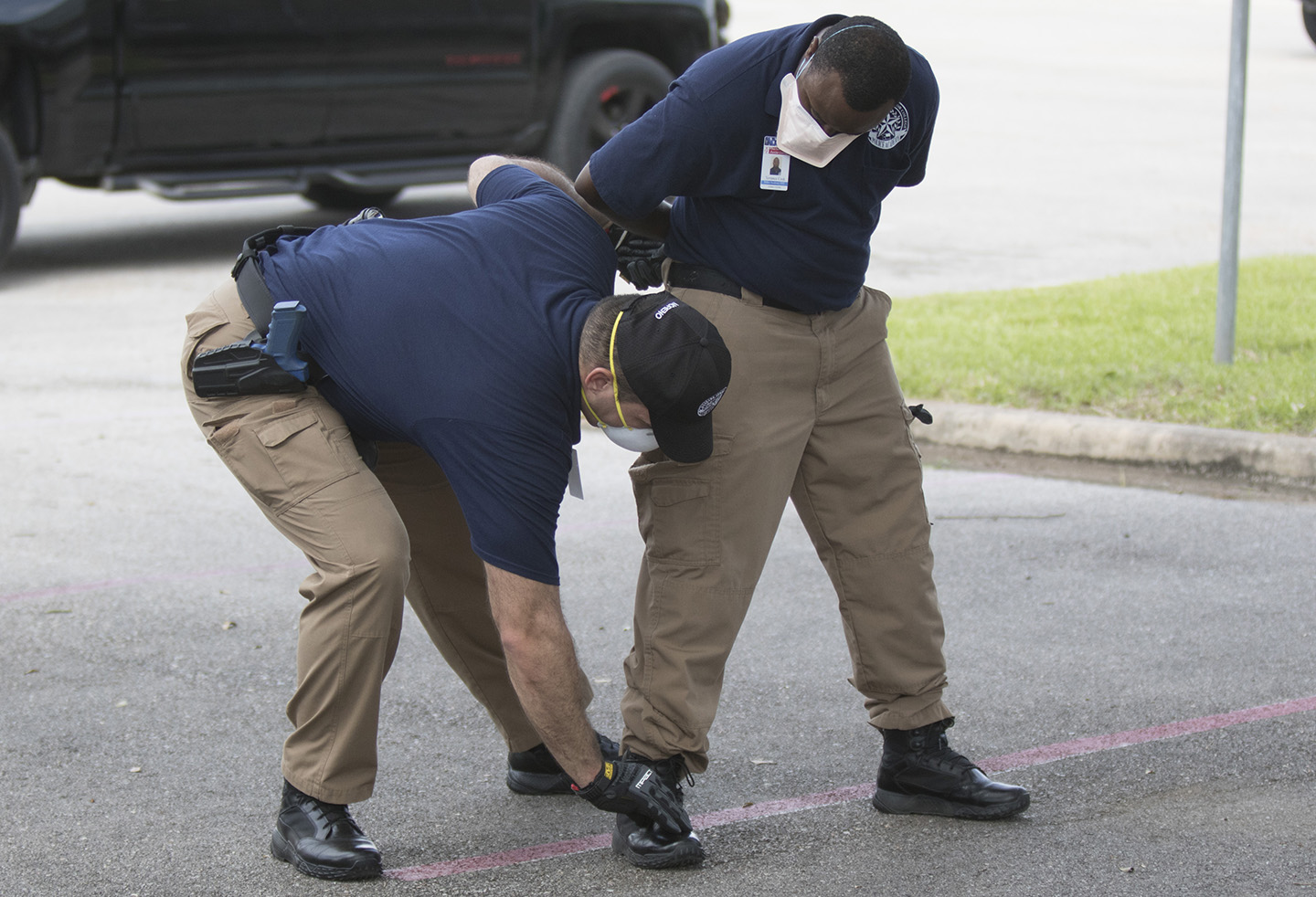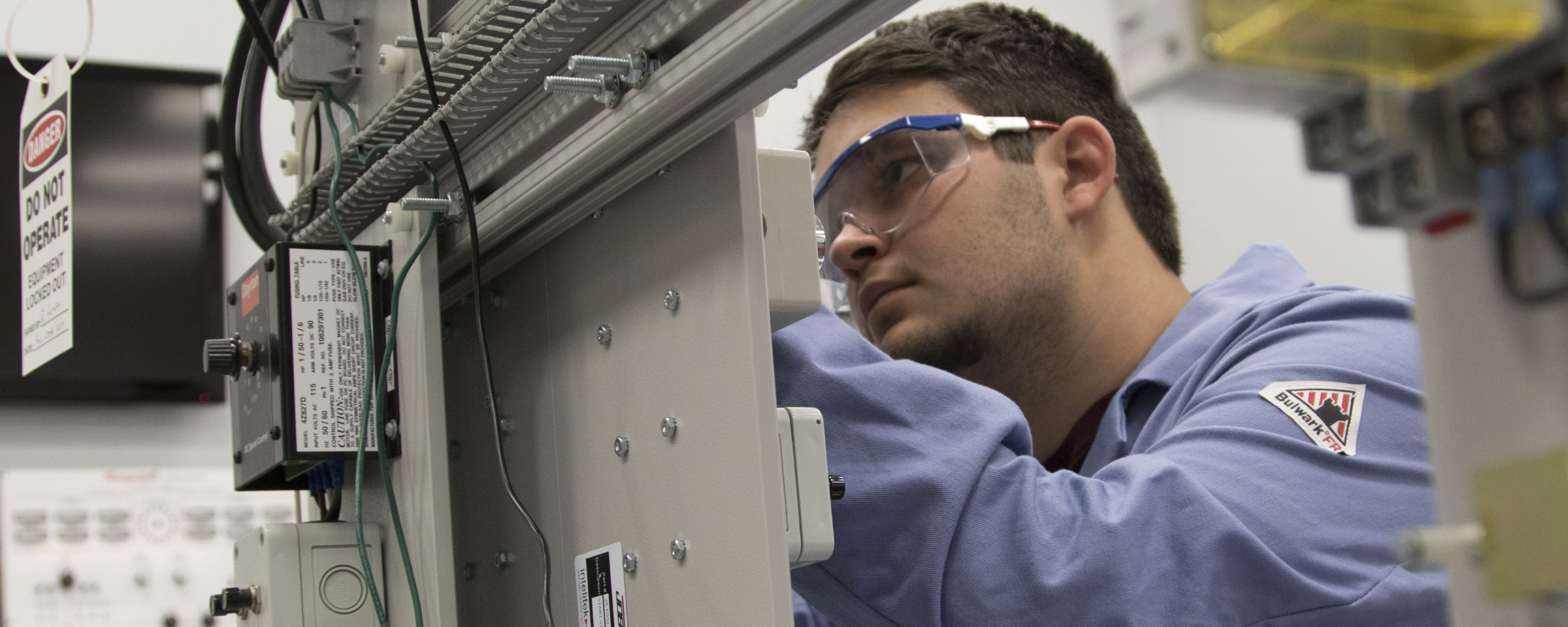
MONITOR AND ADJUST - WCJC EMS, Police Academy continue instruction despite COVID-19

May 18, 2020
FOR IMMEDIATE RELEASE
WCJC Police Academy students practice search and arrest procedures while donning Personal Protection Equipment due to the COVID-19 outbreak.
WHARTON, TEXAS – Wharton County Junior College’s Police Academy and EMS program are doing what they can to continue to provide instruction in the midst of the COVID-19 pandemic. That hasn’t been the easiest of tasks considering both programs rely heavily upon hands-on training.
“All lectures are conducted (online) using Blackboard Collaborate, but skills must be conducted face to face,” said Tim Guin, WCJC’s Police Academy Director. “All Centers for Disease Control and Prevention (CDC) guidelines will be followed and Personal Protective Equipment (PPE) will be worn at all times.”
During a recent outdoor simulation on search and arrest procedures, cadets were required to wear gloves and face coverings despite temperatures in the mid-90s. Earlier this spring, firearms training was conducted with groups of only five students at a time, providing a 12-foot separation that is double the CDC recommendations for social distancing.
Normally, all instruction would be held face to face, according to Texas Commission on Law Enforcement (TCOLE) guidelines. The current hybrid format — mixing online classes with infrequent hands-on scenarios requiring PPE — was necessary due to the COVID-19 virus. Guin said the format had to be approved by TCOLE before implementation.
“It is challenging for the instructors and the students as well,” Guin said.
WCJC’s EMS program — which also relies on a large portion of hands-on training — has also faced an altered method of instruction. Usually conducted entirely face to face at the college’s recently renovated Johnson Health Occupations Center, the program is currently operating entirely online due to the pandemic.
“We have changed to online instruction for the classroom lectures, including live instruction and short video clips. We have put what we can online,” said Gary Bonewald, WCJC’s EMS Program Director. “We still will have to have students report to campus at some time to complete the psychomotor lab skills. These need to be done in a lab setting.”
Bonewald said the hands-on training portion is crucial for program graduates.
“We cannot accomplish producing a competent EMT, AEMT or Paramedic without this lab time,” he said.
Bonewald has additional PPE on hand for when students will be allowed back into the classroom. The EMS program operates under a different licensing agency than the Police Academy and, so far, has been discouraged from conducting any face to face sessions, Bonewald said. That is expected to change soon, possibly for the summer semester.
It’s critical to get students back into the simulation labs as soon as possible. Without the hands-on segment, students will be unable to complete the necessary requirements to graduate. A lack of clinical sites — also due to the COVID-19 pandemic — is a further issue that must be addressed in order for students to obtain the necessary skills.
Bonewald said students — many of whom were more than halfway through the program — are already facing delayed graduation. Like many other educational institutions, WCJC has canceled all spring graduation ceremonies because of the virus.
“Our spring students will all be pushed back into summer at the earliest,” Bonewald said. “We hope to complete these students as soon as we can.”
WCJC Police Academy students are facing a later graduation date as well.
“Provided there are not further delays, the students will complete two weeks late,” Guin said.
As for the future, both programs will monitor and adjust according to recommendations made by their licensing agencies and the CDC.
Bonewald said one positive of the crisis is it has revealed the significance of emergency responders.
“I believe the long term prognosis is very good for program graduates as (COVID-19) has demonstrated that EMS is on the front lines and we need more providers,” he said. “We will be different when we come out on the other side of this crisis. But regardless, we will evolve to meet the needs of our students.”
###

